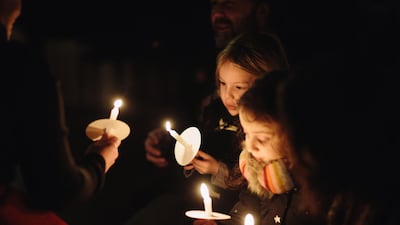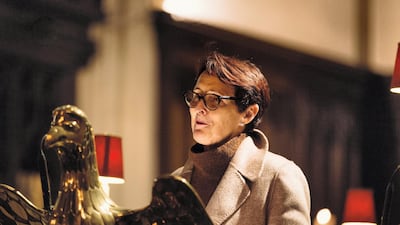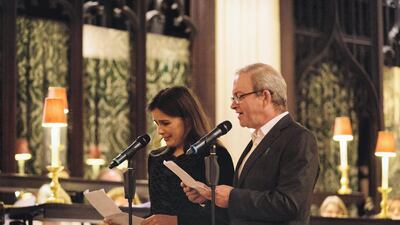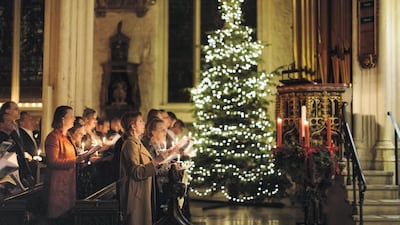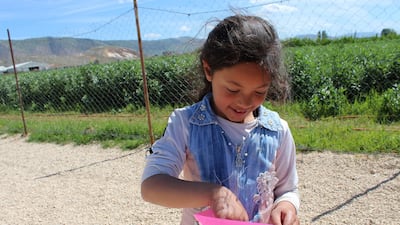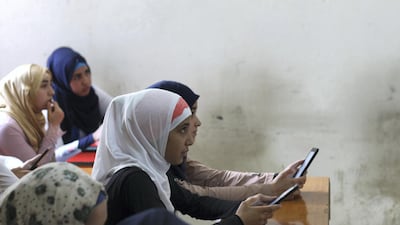In the far north of Syria, near the Balikh River that marks the border with Turkey, the small war-ravaged community of Ali Bajilyah relies on primary health care from an intrepid team of local medical staff funded by a British charity.
Five hundred kilometres away, the Hands Up Foundation also supports an inspiring teaching project in the Bekaa Valley in Lebanon, where 300 Syrian refugee children, many living in tent settlements, are taught basic literacy and numeracy skills to help them access formal education.
But what if the charity were forced to choose patients over pupils, or the other way around? It is precisely this impossible decision between potentially life-saving medical consultations and life-changing school lessons that the foundation fears it will soon have to make with its hard-pressed funds.
Most of the much-needed money for the programmes comes from the highlight of Hands Up's fundraising calendar – the annual Singing for Syrians Christmas concert held these past five years in St Margaret's Church in the grounds of Westminster Abbey.

Ordinarily by the beginning of December, 900 tickets would have been sold, £30,000 ($40,017) in sponsorship pledged and collection plates put out at the back of the church in readiness to receive perhaps £5,000 in good will.
In these pandemic times, however, uncertainty is crippling participation in the 2020 virtual event, with only 400 tickets sold so far for the carol service on Wednesday, in spite of a star-studded array of performers, including satirist Barry Humphries in Dame Edna guise, physician and poet Fouad M. Fouad, actress Helen McCrory, singer Katie Melua and author Michael Morpurgo.
According to George Butler, one of the four British founders of the Hands Up Foundation, there is a myth that Londoners tell each other about Covid hitting everybody equally. “But that’s not true,” Mr Butler says. “The financially poor are the worst off and those relying on others, especially those across borders in Syria, have been hugely affected.

“Where we are operating in northern Syria, there is hardly a single case of Covid because no one is allowed in or out but the effects of Covid on delivering aid there are huge. That’s the message we are trying to get across: we are not going to a virtual event because we think it’s better than a physical one, we are doing it because our hand has really been forced.
“If we don’t do that, we have to make a difficult decision between cutting doctors’ salaries – 20 doctors, 20 medical staff that we paid for during the last four years – or we have to choose between 300 kids, and that’s a very real choice.”
The charitable foundation, which aims to empower Syrian communities by giving people “a hand up, not a handout”, began in 2012 as a supper club organised by Mr Butler and three friends. Inspired by time they had spent in Damascus, they set out to raise money and awareness for those they had left behind.
Since then, Hands Up’s CEO Rose Lukas says they have joined forces with other charities including the Syrian American Medical Society (SAMS) and SAWA for Development and Aid in channelling £4 million through partner organisations on the ground “who know the needs and the context of those communities better than anyone”.
The driving principle, Ms Lukas said, was to give people a livelihood to support themselves and their families so that they, in turn, could provide vital services to their local communities.
The Hands Up Foundation had hoped at the start of the year to raise another £100,000 from the Singing for Syrians event this week, but that was before the coronavirus came along. Ms Lukas says that the impact of the pandemic goes far beyond those who have been infected by Covid-19, noting that the most vulnerable always pay the greatest price.
“In some ways, it is a really good opportunity to see how else we can raise funds and how else we can sustain different income streams, but it has been a huge challenge,” she said.
“I think it’s really hard to predict, but if we don’t raise enough this year we would have to consider cutting some of the funds that we send to the primary health clinic or the school in the next year.”
Covid-affected revenue streams
She says that the response from donors has been galvanising when the charity frames the situation in the stark wording of “these are the options – you will have to choose”. But while the Hands Up Foundation considers itself lucky to have steadfast financial supporters, Ms Lukas concedes that there is always a limit to largesse.
“Particularly with philanthropists,” she said, “if their income is being hit by Covid or a global recession, they will simply have fewer funds available for humanitarian settings.
“In general, they would like to keep supporting to some degree … whether they can do it to the same extent is another question.”

The school is currently closed in line with government guidance on Covid-19 for educational institutions, making pupils’ needs all the more desperate when the project opens its doors again.
For its part, the medical team running the primary health clinic has endured hardships other than coronavirus that have brought a halt to the average of 3,000 consultations a month carried out by staff free of charge.
They have been bombed three times, on each occasion impressing Hands Up’s co-founders with their bravery and resilience in getting back up and running again within 10 days.
Dr Yahya Alrahal, a pathologist with SAMS, says that it is one of the rare clinics with support in the deserted area, where there is a lack of infrastructure, electricity and water, let alone medical supplies, equipment and health workers. The nearest alternative centre, Dr Alrahal says, is 20 kilometres away in Tel Abyad city, a distance that many people can’t traverse given the unavailability of public transport.
“The centre basically provides hope for many families that rely on its services, and an opportunity for the few health workers in the area to be supported to remain while making them useful to their communities and preserving local resilience,” he said.
Putting the pandemic into global perspective
Michael Morpurgo, who has spoken in the past about being deeply affected by seeing images of the body of the three-year-old Syrian boy Alan Kurdi washed up on a Turkish beach in 2015, will perform a reading for the Singing for Syrians event.
The plight of such migrants prompts Mr Morpurgo to point out that the pandemic may have been fearsome and overwhelming for those in Britain, but the people of Syria have faced much worse for years.
“No one is bombing us, invading us, destroying our homes, killing friends and family in front of our eyes, driving us out of our country to exist as refugees, where we are crowded together in vast camps enduring unbelievable hardship, and now the pandemic, too, which threatens to spread through the camps like wildfire,” he says.
“We often use the phrase ‘Lest we forget’ when we are remembering the suffering of those from our country who suffered and died in our wars. Let’s do that for the people of Syria, too. In our time of trouble, let’s not forget them.”
*The Hands Up Foundation is also raising money this week via The Big Give Christmas Campaign in which philanthropists match pound for pound donations made between December 1 and 8.
